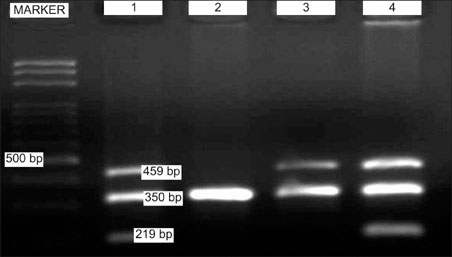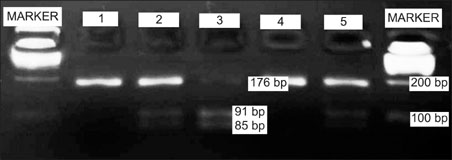J Gynecol Oncol.
2010 Sep;21(3):169-173. 10.3802/jgo.2010.21.3.169.
GST (GSTM1, GSTT1, and GSTP1) polymorphisms in the genetic susceptibility of Turkish patients to cervical cancer
- Affiliations
-
- 1Department of Obstetrics and Gynecology, Uludag University Medical Faculty, Bursa, Turkey.
- 2Department of Medical Genetics, Uludag University Medical Faculty, Bursa, Turkey. tyakut@uludag.edu.tr
- KMID: 1980853
- DOI: http://doi.org/10.3802/jgo.2010.21.3.169
Abstract
OBJECTIVE
This work investigates the role of glutathione S-transferase M1 (GSTM1), glutathione S-transferase T1 (GSTT1), and glutathione S-transferase P1 (GSTP1) enzymes and polymorphisms, which are found in phase II detoxification reactions in the development of cervical cancer.
METHODS
This study was conducted with 46 patients diagnosed with cervical cancer and 52 people with no cancer history. Multiplex PCR methods were used to evaluate the GSTM1 and GSTT1 gene polymorphism. However, the GSTP1 (Ile105Val) gene polymorphism was studied using a PCR-RFLP method. The patient and control groups were compared using a chi-square test with p<0.05.
RESULTS
In the patient group, statistical significance was determined for gravidity (p=0.03), parity (p=0.01), and the number of living children (p=0.01) compared to the control group. The gene frequency of GSTM1, GSTT1, and GSTP1 polymorphisms was evaluated. We observed that GSTM1 and GSTT1 null genotype frequencies were 54.3% and 32.6% respectively, while GSTP1 (Ile/Val), (Ile/Ile), (Val/Val) genotype frequencies were 52%, 44%, and 4%, respectively, in the cervical cancer patients. No statistical variation was determined between the control and patient groups in terms of GSTM1, GSTT1, and GSTP1 polymorphisms (p>0.05).
CONCLUSION
Our results demonstrate that GSTT1, GSTM1, and GSTP1 polymorphisms are not associated with cervical cancer in Turkish patients.
Keyword
MeSH Terms
Figure
Reference
-
1. Pate Capps N, Stewart A, Burns C. The interplay between secondhand cigarette smoke, genetics, and cervical cancer: a review of the literature. Biol Res Nurs. 2009. 10:392–399.2. Moodley M. Update on pathophysiologic mechanisms of human papillomavirus. Curr Opin Obstet Gynecol. 2005. 17:61–64.3. Trunk MJ, Wentzensen N, von Knebel Doeberitz M. Molecular pathogenesis of cervical cancer and its first steps. Pathologe. 2005. 26:283–290.4. Sobti RC, Kaur S, Kaur P, Singh J, Gupta I, Jain V, et al. Interaction of passive smoking with GST (GSTM1, GSTT1, and GSTP1) genotypes in the risk of cervical cancer in India. Cancer Genet Cytogenet. 2006. 166:117–123.5. La Vecchia C, Negri E, Franceschi S, Parazzini F. Long-term impact of reproductive factors on cancer risk. Int J Cancer. 1993. 53:215–219.6. Capalash N, Sobti RC. Epidemiology of cervical cancer: a case control study on north Indian population. Indian J Cancer. 1999. 36:179–185.7. Winkelstein W Jr. Smoking and cancer of the uterine cervix: hypothesis. Am J Epidemiol. 1977. 106:257–259.8. Settheetham-Ishida W, Singto Y, Yuenyao P, Tassaneeyakul W, Kanjanavirojkul N, Ishida T. Contribution of epigenetic risk factors but not p53 codon 72 polymorphism to the development of cervical cancer in Northeastern Thailand. Cancer Lett. 2004. 210:205–211.9. Coker AL, Bond SM, Williams A, Gerasimova T, Pirisi L. Active and passive smoking, high-risk human papillomaviruses and cervical neoplasia. Cancer Detect Prev. 2002. 26:121–128.10. Winkelstein W Jr. Smoking and cervical cancer: current status: a review. Am J Epidemiol. 1990. 131:945–957.11. Gram IT, Austin H, Stalsberg H. Cigarette smoking and the incidence of cervical intraepithelial neoplasia, grade III, and cancer of the cervix uteri. Am J Epidemiol. 1992. 135:341–346.12. Kim JW, Lee CG, Park YG, Kim KS, Kim IK, Sohn YW, et al. Combined analysis of germline polymorphisms of p53, GSTM1, GSTT1, CYP1A1, and CYP2E1: relation to the incidence rate of cervical carcinoma. Cancer. 2000. 88:2082–2091.13. Malats N, Camus-Radon AM, Nyberg F, Ahrens W, Constantinescu V, Mukeria A, et al. Lung cancer risk in nonsmokers and GSTM1 and GSTT1 genetic polymorphism. Cancer Epidemiol Biomarkers Prev. 2000. 9:827–833.14. Reszka E, Wasowicz W, Gromadzinska J. Genetic polymorphism of xenobiotic metabolising enzymes, diet and cancer susceptibility. Br J Nutr. 2006. 96:609–619.15. Joseph T, Chacko P, Wesley R, Jayaprakash PG, James FV, Pillai MR. Germline genetic polymorphisms of CYP1A1, GSTM1 and GSTT1 genes in Indian cervical cancer: associations with tumor progression, age and human papillomavirus infection. Gynecol Oncol. 2006. 101:411–417.16. Singh H, Sachan R, Devi S, Pandey SN, Mittal B. Association of GSTM1, GSTT1, and GSTM3 gene polymorphisms and susceptibility to cervical cancer in a North Indian population. Am J Obstet Gynecol. 2008. 198:303.e1–303.e6.17. Abbas A, Delvinquiere K, Lechevrel M, Lebailly P, Gauduchon P, Launoy G, et al. GSTM1, GSTT1, GSTP1 and CYP1A1 genetic polymorphisms and susceptibility to esophageal cancer in a French population: different pattern of squamous cell carcinoma and adenocarcinoma. World J Gastroenterol. 2004. 10:3389–3393.18. Idle JR. Is environmental carcinogenesis modulated by host polymorphism? Mutat Res. 1991. 247:259–266.19. Nebert DW. Role of genetics and drug metabolism in human cancer risk. Mutat Res. 1991. 247:267–281.20. Mannervik B, Danielson UH. Glutathione transferases: structure and catalytic activity. CRC Crit Rev Biochem. 1988. 23:283–337.21. Nakachi K, Imai K, Hayashi S, Kawajiri K. Polymorphisms of the CYP1A1 and glutathione S-transferase genes associated with susceptibility to lung cancer in relation to cigarette dose in a Japanese population. Cancer Res. 1993. 53:2994–2999.22. Zhong S, Howie AF, Ketterer B, Taylor J, Hayes JD, Beckett GJ, et al. Glutathione S-transferase mu locus: use of genotyping and phenotyping assays to assess association with lung cancer susceptibility. Carcinogenesis. 1991. 12:1533–1537.23. Brockmoller J, Kerb R, Drakoulis N, Staffeldt B, Roots I. Glutathione S-transferase M1 and its variants A and B as host factors of bladder cancer susceptibility: a case-control study. Cancer Res. 1994. 54:4103–4111.24. Hosgood HD 3rd, Berndt SI, Lan Q. GST genotypes and lung cancer susceptibility in Asian populations with indoor air pollution exposures: a meta-analysis. Mutat Res. 2007. 636:134–143.25. Shi X, Zhou S, Wang Z, Zhou Z. CYP1A1 and GSTM1 polymorphisms and lung cancer risk in Chinese populations: a meta-analysis. Lung Cancer. 2008. 59:155–163.26. Srivastava DS, Mishra DK, Mandhani A, Mittal B, Kumar A, Mittal RD. Association of genetic polymorphism of glutathione S-transferase M1, T1, P1 and susceptibility to bladder cancer. Eur Urol. 2005. 48:339–344.27. Warwick A, Sarhanis P, Redman C, Pemble S, Taylor JB, Ketterer B, et al. Theta class glutathione S-transferase GSTT1 genotypes and susceptibility to cervical neoplasia: interactions with GSTM1, CYP2D6 and smoking. Carcinogenesis. 1994. 15:2841–2845.28. de Carvalho CR, da Silva ID, Pereira JS, de Souza NC, Focchi GR, Ribalta JC. Polymorphisms of p53, GSTM1 and GSTT1, and HPV in uterine cervix adenocarcinoma. Eur J Gynaecol Oncol. 2008. 29:590–593.29. Settheetham-Ishida W, Yuenyao P, Kularbkaew C, Settheetham D, Ishida T. Glutathione S-transferase (GSTM1 and GSTT1) polymorphisms in cervical cancer in Northeastern Thailand. Asian Pac J Cancer Prev. 2009. 10:365–368.30. Chen C, Madeleine MM, Weiss NS, Daling JR. Glutathione S-transferase M1 genotypes and the risk of squamous carcinoma of the cervix: a population-based case-control study. Am J Epidemiol. 1999. 150:568–572.31. Sharma A, Sharma JK, Murthy NS, Mitra AB. Polymorphisms at GSTM1 and GSTT1 gene loci and susceptibility to cervical cancer in Indian population. Neoplasma. 2004. 51:12–16.32. Jee SH, Lee JE, Kim S, Kim JH, Um SJ, Lee SJ, et al. GSTP1 polymorphism, cigarette smoking and cervical cancer risk in Korean women. Yonsei Med J. 2002. 43:712–716.
- Full Text Links
- Actions
-
Cited
- CITED
-
- Close
- Share
- Similar articles
-
- GSTM1, GSTT1 and GSTP1 Polymorphisms in the Korean Population
- Relationship between Genetic Polymorphisms of the Gltathione S-transferase and Endometriosis Susceptibility in Korean Populations
- Association between Glutathione S-Transferase T1, M1, and P1 Genotypes and the Risk of Colorectal Cancer
- Glutathione S-transferase Gene Polymorphisms and Systemic Lupus Erythematosus
- Polymorphisms within Glutathione S-transferase Genes in Childhood Acute Lymphoblastic Leukemia



